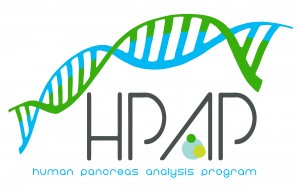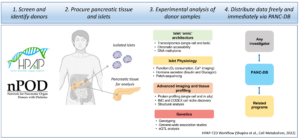HPAP T2D: Human Pancreas Analysis Program (Vanderbilt)
Contact PI: Al Powers, MD, Vanderbilt University (U01 DK123716)
Mark Atkinson, PhD, Investigator, University of Florida
Marcela Brissova, PhD, Investigator, Vanderbilt University
Patrick MacDonald, PhD, Investigator, University of Alberta
Seung Kim, MD, PhD, Investigator, Stanford University
Anna Golyn, PhD, Investigator, Stanford University
Rita Bottino, PhD, Investigator, Allegheny Health Network (09/2019 – 01/2022)
Dirk Homann, MD, Investigator, Icahn School of Medicine at Mount Sinai
Chunhua Dai, MD, Investigator, Vanderbilt University
Start Date: September 30, 2019
Abstract
To understand the molecular mechanisms responsible for islet dysfunction in type 2 diabetes mellitus (T2D), investigators in the Human Pancreas Analysis Program (HPAP-T2D) are working to interrogate T2D human pancreatic tissue and islets from clinically phenotyped donors using a range of experimental approaches including single cell analysis, multiplexing technology, cell function, and genetic analysis. Data from these studies will be deposited into the comprehensive, open-access, searchable HPAP database (PANC-DB) to serve the community of scientists interested in understanding human pancreatic and islet biology in T2D. Investigators are working to create, enhance, and leverage partnerships with complementary programs like HPAP-T1D, HIRN, IIDP, nPOD, AMP-T2D, and QUOD. Investigators in this grant are working collaboratively with investigators at the University of Pennsylvania (U01DK123594) to understand the molecular mechanisms responsible for islet dysfunction in type 2 diabetes.
 |
 |
Meet the Grant Team
Investigators |
|
Alvin Powers, MDVanderbilt University |
Mark Atkinson, PhDUniversity of Florida |
Marcela Brissova, PhDVanderbilt University |
Patrick MacDonald, PhDUniversity of Alberta |
|
Seung Kim, PhDStanford University |
Anna Golyn, PhDStanford University |
Ria Bottino, PhDAllegheny Health Network |
Dirk Homann, MDIcahn School of Medicine at Mount Sinai |
|
Chunhua Dai, PhDVanderbilt University |
|
Publications
- CelLink: integrating single-cell multi-omics data with weak feature linkage and imbalanced cell populations
- Supervised machine learning identifies impaired mitochondrial quality control in β cells with development of type 2 diabetes
- Altered immune and metabolic molecular pathways drive islet cell dysfunction in human type 1 diabetes
- Single-cell multiome and spatial profiling reveals pancreas cell type-specific gene regulatory programs of type 1 diabetes progression
- Integrative single-cell multi-omics profiling of human pancreatic islets identifies T1D-associated genes and regulatory signals
- The pathophysiology, presentation and classification of Type 1 diabetes
- The antigen presentation landscape of cytokine-stressed human pancreatic islets
- Epigenetic adaptation of beta cells across lifespan and disease: age-related demethylation is advanced in type 2 diabetes
- Spatial transcriptomics from pancreas and local draining lymph node tissue reveals a lymphotoxin-β signature in human type 1 diabetes
- Immune perturbations in human pancreas lymphatic tissues prior to and after type 1 diabetes onset
- Functional and Mechanistic Explanation for the Unique Clinical Success of the Glucokinase Activator Dorzagliatin in the Treatment of Type 2 Diabetes
- Closing the Gap Between Vision and Victory in Type 1 Diabetes: The NIDDK Human Islet Research Network (HIRN) Initiative
- Single-cell multiome and spatial profiling reveals pancreas cell type-specific gene regulatory programs driving type 1 diabetes progression
- IFN-α Induces Heterogenous ROS Production in Human β-Cells
- The XCL1/XCR1 axis is upregulated in type 1 diabetes and aggravates its pathogenesis
- TMEM55A-mediated PI5P signaling regulates α-cell actin depolymerization and glucagon secretion
- G6PC2 controls glucagon secretion by defining the set point for glucose in pancreatic α cells
- Heterogeneous endocrine cell composition defines human islet functional phenotypes
- Sex-specific regulatory architecture of pancreatic islets from subjects with and without type 2 diabetes
- Human peripancreatic adipose tissue paracrine signaling impacts insulin secretion, blood flow, and gene transcription
- Thermal Denaturation of Fresh Frozen Tissue Enhances Mass Spectrometry Detection of Peptides
- HumanIslets.com: Improving accessibility, integration, and usability of human research islet data
- Immune perturbations in human pancreas lymphatic tissues prior to and after type 1 diabetes onset
- Single cell multiome profiling of pancreatic islets reveals physiological changes in cell type-specific regulation associated with diabetes risk
- No evidence for persistent enteroviral B infection of pancreatic islets in type 1 diabetic and pre-diabetic patients from RNA-Seq data
- Identification of unique cell type responses in pancreatic islets to stress
- HumanIslets: An integrated platform for human islet data access and analysis
- AnnoSpat annotates cell types and quantifies cellular arrangements from spatial proteomics
- NKX2-2 based nuclei sorting on frozen human archival pancreas enables the enrichment of islet endocrine populations for single-nucleus RNA sequencing
- DNA methylation-based assessment of cell composition in human pancreas and islets
- Disrupted RNA editing in beta cells mimics early-stage type 1 diabetes
- RFX6 maintains gene expression and function of adult human islet α cells
- Genetic risk converges on regulatory networks mediating early type 2 diabetes
- Human Pseudoislet System for Synchronous Assessment of Fluorescent Biosensor Dynamics and Hormone Secretory Profiles
- Exocrine pancreas in type 1 and type 2 diabetes: different patterns of fibrosis, metaplasia, angiopathy, and adiposity
- Benchmarking algorithms for joint integration of unpaired and paired single-cell RNA-seq and ATAC-seq data
- The leptin receptor has no role in delta-cell control of beta-cell function in the mouse
- An Integrated Map of Cell Type-Specific Gene Expression in Pancreatic Islets
- Pericyte dysfunction and impaired vasomotion are hallmarks of islets during the pathogenesis of type 1 diabetes
- Inferring regulators of cell identity in the human adult pancreas
- Integrating genetics with single-cell multiomic measurements across disease states identifies mechanisms of beta cell dysfunction in type 2 diabetes
- The human α cell in health and disease
- Peeling the onion: another layer in the regulation of insulin secretion
- Integrated Physiology of the Exocrine and Endocrine Compartments in Pancreatic Diseases: Workshop Proceedings
- Generation of functional thymic organoids from human pluripotent stem cells
- Metabolic Messengers: glucagon
- An integrated map of cell type-specific gene expression in pancreatic islets
- Human pancreatic capillaries and nerve fibers persist in type 1 diabetes despite beta cell loss
- Integration of single-cell multiomic measurements across disease states with genetics identifies mechanisms of beta cell dysfunction in type 2 diabetes
- Understanding islet dysfunction in type 2 diabetes through multidimensional pancreatic phenotyping: The Human Pancreas Analysis Program
- Aging compromises human islet beta cell function and identity by decreasing transcription factor activity and inducing ER stress
- 3D chromatin maps of the human pancreas reveal lineage-specific regulatory architecture of T2D risk
- Every islet matters: improving the impact of human islet research
- Adaptation to chronic ER stress enforces pancreatic β-cell plasticity
- α Cell dysfunction in islets from nondiabetic, glutamic acid decarboxylase autoantibody-positive individuals
- Variant-to-gene-mapping analyses reveal a role for pancreatic islet cells in conferring genetic susceptibility to sleep-related traits
- Guidelines for standardizing T-cell cytometry assays to link biomarkers, mechanisms, and disease outcomes in type 1 diabetes
- Limited extent and consequences of pancreatic SARS-CoV-2 infection
- Cryopreservation and post-thaw characterization of dissociated human islet cells
- Islet Lymphocytes Maintain a Stable Regulatory Phenotype Under Homeostatic Conditions and Metabolic Stress
- RFX6-mediated dysregulation defines human β cell dysfunction in early type 2 diabetes
- Microvessels enhance vascularization and function of transplanted insulin-producing cells
- Integrated Analysis of the Pancreas and Islets Reveals Unexpected Findings in Human Male With Type 1 Diabetes
- What is a β cell? – Chapter I in the Human Islet Research Network (HIRN) Review Series
- Debates in Pancreatic Beta Cell Biology: Proliferation Versus Progenitor Differentiation and Transdifferentiation in Restoring β Cell Mass
- The Human Islet: Mini-organ with Mega-impact
- Type 1 diabetes mellitus: much progress, many opportunities
- Pancreatic islet reserve in type 1 diabetes
- SIX2 and SIX3 coordinately regulate functional maturity and fate of human pancreatic β cells
- SARS-CoV-2 Cell Entry Factors ACE2 and TMPRSS2 Are Expressed in the Microvasculature and Ducts of Human Pancreas but Are Not Enriched in β Cells
- Mass cytometry and type 1 diabetes research in the age of single-cell data science










